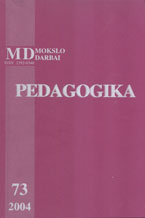Ekologinių-etinių nuostatų ugdymas Lietuvos ir Latvijos pradinės mokyklos gamtamoksliniuose kursuose
Development of Ecological-Ethical Attitudes at Natural Science Courses Taught at Lithuanian and Latvian Primary Schools
Author(s): Rita Makarskaitė-Petkevičienė, Violeta LaurukėnaitėSubject(s): Education
Published by: Vytauto Didžiojo Universitetas
Keywords: primary school; natural education; education program.
Summary/Abstract: The article is an introduction to Lithuanian and Latvian primary school courses of Natural Education in the aspects of ecological-ethical attitude realisation. The article also turns the readers' attention to promotion of practical protective and ecological activities to schoolchildren. The readers can also find here an analysis of educational aid kits prepared by V. Jonyniene as well as those by R. Arajs, V. Drulle and A. Miesniece. An analysis of Natural Education course contents applied at Lithuanian and Latvian primary schools indicates that schoolbook materials are a means of developing schoolchildren's ecological-ethical attitudes towards their natural environment. The above-listed schoolbook authors understand the importance of individuals' evaluative relations with the environment and present it in quite similar ways. The common features of the programmes are as follows: care and protection of animals and plants; rules of behaviour while staying in the nature; tidying and beautifying one's environment; protection of forests, water and soils; economising water in everyday life, etc. Latvian schoolbooks pay more attention to protected territories, zoos and rules for gathering medical plants and mushrooms. Meanwhile, Lithuanian schoolbooks are more aimed at global issues like ecosystem changes, the greenhouse effect, dumping problems, etc. Despite the differences listed above, programmes of both the countries only contain poor diversity of practical ecological activities offered to learners. The offered minimum of materials and activities can hardly provide conditions for the ecological knowledge acquired to become a norm of interaction with the environment. An overview of 684 Lithuanian primary school teachers' opinions on how much the World Orientation course contributes to developing schoolchildren's evaluative attitudes towards their natural environment indicates that the majority of the teachers (60.8 %) think that an integrated course of World Orientation belonging to the cycle of Natural Education subjects has importance while developing harmonious learner-environment relations. It contributes while creating schoolchildren's outlook based on humanistic values.
Journal: Pedagogika
- Issue Year: 2004
- Issue No: 73
- Page Range: 25-32
- Page Count: 8
- Language: Lithuanian

